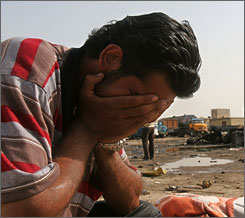Amid calls for a change in US strategy in Iraq and the continuing trauma that its citizens are going through on a daily basis (all pretense that Iraq was a military success has long been dispelled, to such an extent that the Iraqi president and prime minister no longer feel the need even to serve as mouthpieces to the US administration), the country is rapidly turning into a potential tinderbox for regional instability.
 This potentiality was compounded earlier this week when Saudi Arabia said that in the eventuality of a US pull-out of Iraq and sustained violence, the Saudi regime would bankroll Iraqi Sunnis — the religious minority in Iraq — as they try to defend themselves against a Shiite onslaught. Something like this happening would exacerbate the unhealthy polarization that has been building up in the Middle East, a Sunni-Shiite divide that is on the brink of burning hotter than it did when Saddam Hussein invaded Iran in the early 1980s to prevent Grand Ayatollah Khomeini’s exportation of his Shiite Islamic Revolution to the region.
This potentiality was compounded earlier this week when Saudi Arabia said that in the eventuality of a US pull-out of Iraq and sustained violence, the Saudi regime would bankroll Iraqi Sunnis — the religious minority in Iraq — as they try to defend themselves against a Shiite onslaught. Something like this happening would exacerbate the unhealthy polarization that has been building up in the Middle East, a Sunni-Shiite divide that is on the brink of burning hotter than it did when Saddam Hussein invaded Iran in the early 1980s to prevent Grand Ayatollah Khomeini’s exportation of his Shiite Islamic Revolution to the region.At its meekest, such a scenario would fuel a civil war in Iraq, with Saudi Arabia (and perhaps other rich kingdoms in the Middle East) providing money to the Iraqi Sunnis while Iran would reciprocate with the Shiites. The middle — and probably likelier — scenario would involve a war-by-proxy between Iran and Saudi Arabia, where to the money being sent to Iraq we would also see weapons and the training of Iraqi forces by Tehran and Riyadh. Those proxy forces would wage war against each other as instruments in the two states’ strategy for the region. Much as in the Democratic Republic of the Congo, the proxies would be encouraged to seize strategic natural resources — in Iraq’s case oil — not only to fund themselves but to provide a channel to the countries backing them. It wouldn’t be surprising if, in such a scenario, Iran and Saudi Arabia were to justify such seizures by claiming that they need the resources as a form of reimbursement for their peacekeeping efforts in Iraq.
The worst-case-scenario, of course, involves direct war between Iran and Saudi Arabia. While this eventuality is a distant one, Iraq has nevertheless proven that it is quite capable of dismembering plans of all kinds and take superior armies to their lowest. A giant is now caught between the unpalatable choices of leaving a mess behind or staying in and being unable to change a thing, its sons and daughters meanwhile adding to the already stratospheric casualty rate. If the US, and to a lesser extent the UK, is unable to follow the course it set for itself in Iraq, there is no knowing what would happen to Saudi and Iranian ones, which are not only far less professional but whose leaders have far greater and immediate interests in Iraq, as it is a neighbor and one whose civil war could very well threaten them at home.
On clear winner in this scenario — and let’s hope it never comes to happen — would be al-Qaeda. War between Iran and Saudi Arabia could finally help it achieve one of its original objectives, an objective that came years before its overt enmity towards the US: toppling the Saudi regime. While it certainly is no ally of Iran, al-Qaeda would adopt the age-old “the enemy of my enemy is my friend” approach and could do this even as Tehran remains hostile to its philosophy. No state-terrorist meeting need take place; in fact, an alliance per se doesn’t even need to be made. All al-Qaeda would need to do is ensure that Iraqi Sunnis are being massacred by their Shiite counterparts, with funding and help from Tehran. The harsher the Sunni response (with Saudi funding and support), the more Shiites will in turn be killed, and so on and so forth, tit-for-tat until war between Saudi Arabia and Iran becomes inevitable. The only thing al-Qaeda in Iraq needs to do is target Sunnis — which it already has — and make it look as if this were the work of Shiites.
How ironic, if this were to happen, that by invading Iraq in 2003 the US would have taken Bin Laden and his cohorts ever so closer to their goal of threatening the despised Saudi regime. We are thankfully still far from such a scenario taking place, but the seeds are there, and thanks to US bungling in Iraq, this scenario certainly isn’t confabulation anymore. For the first time, Riyadh could be facing a real threat to its existence. Did al-Qaeda plan for all of this to come about? Who knows. But one thing is certain: someone, somewhere, is seeing the possibilities as they unfold. And he must be smiling a large smile at the moment.

No comments:
Post a Comment
Note: Only a member of this blog may post a comment.